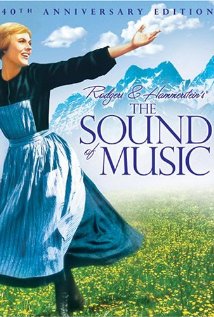Rating: 3 stars (out of 4)
The Sound of Music (1965): Dir. Robert Wise. Written by: Ernest Lehman. Lyrics by Oscar Hammerstein. Music by Richard Rodgers. Based upon the musical of the same name with book by Howard Lindsay and Russel Crouse, itself based upon the memoir The Story of the Trapp Family Singers by Maria von Trapp. Starring: Julie Andrews, Christopher Plummer, Eleanor Parker, Richard Haydn, and Charmian Carr. Rated G. Running time: 174 minutes.
 Robert Wise directs a film where a girl named Maria pines for a forbidden love? Nope, it’s not West Side Story this time. Steeped in pre-WWII nostalgia, The Sound of Music balances pure cheese with solid Hollywood fundamentals.
Robert Wise directs a film where a girl named Maria pines for a forbidden love? Nope, it’s not West Side Story this time. Steeped in pre-WWII nostalgia, The Sound of Music balances pure cheese with solid Hollywood fundamentals.
In an Austrian convent, nun-in-training Maria spends more time singing praises to Mother Nature than the Holy Father. Sensing her free-spiritedness, Mother Superior gives her a job as a governess for a motherless family. Maria’s maternal instincts help her tend the children, but can they help her survive the encroaching Nazi invasion?
From the opening eponymous number, The Sound of Music embraces its cornball tone with gusto. And while you want to mock it for its naiveté, you can’t help but admire it at the same time. Much credit is due to Julie Andrews, who brings warmth, levity and humor to the von Trapp household. She parries their initial animosity with charm and a surprising amount of musical knowledge—she makes you believe problems can wither simply by her presence. And Christopher Plummer adds sophistication and bullheadedness to the proceedings. Predictably, the two end up together, but the adversity to their courtship makes the inevitable union a satisfying one.
Director Wise seems well-aware of the inherent cheesiness of the material. He almost seems to jeer along with us as the children frolic through the countryside trilling “Do-Re-Mi.” Compare this to the film’s last act, when the von Trapps attempt to flee a Nazi pursuit. Suddenly Austria is bathed in shadow and the songs are gone. Wise gets considerable tension and suspense during the ensuing manhunt. It’s a somber reminder that Maria’s buoyancy has its limitations.
Unlike some other musicals on this countdown, Sound successfully balances innocence and darkness, all while moving at a crisp pace. It’s a guilty pleasure that offers more pleasure than guilt.
Next film: A Man for All Seasons, 1966